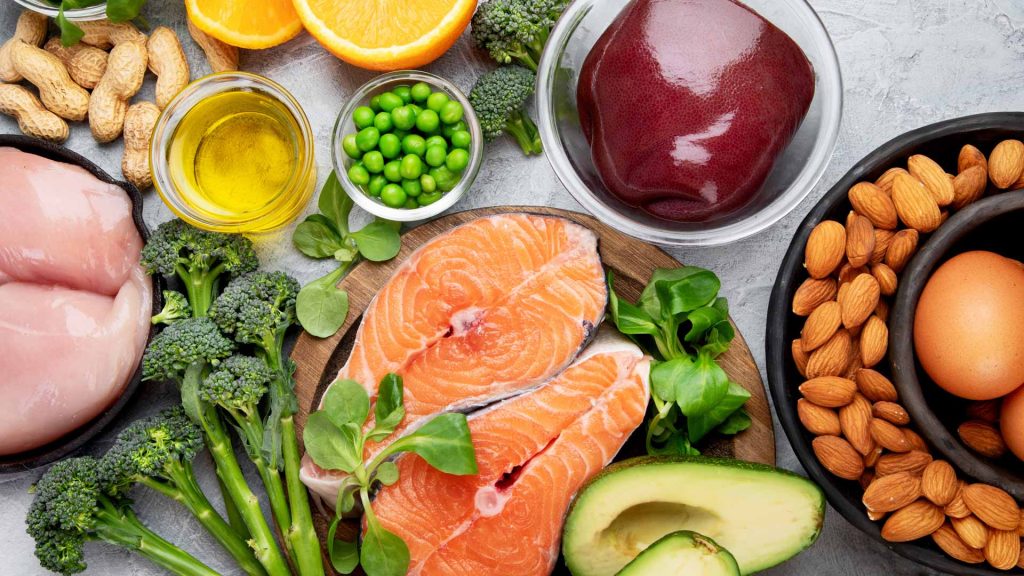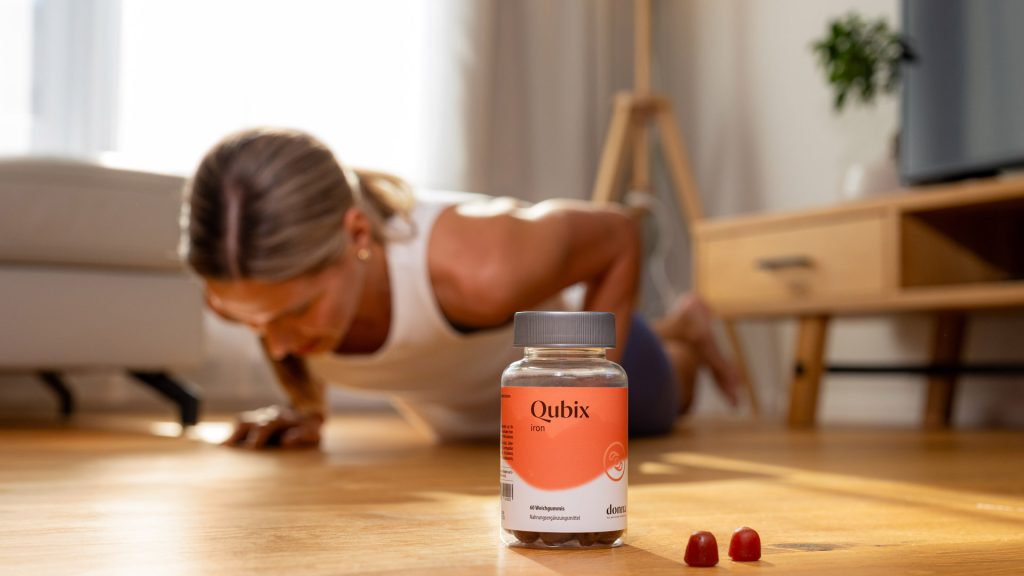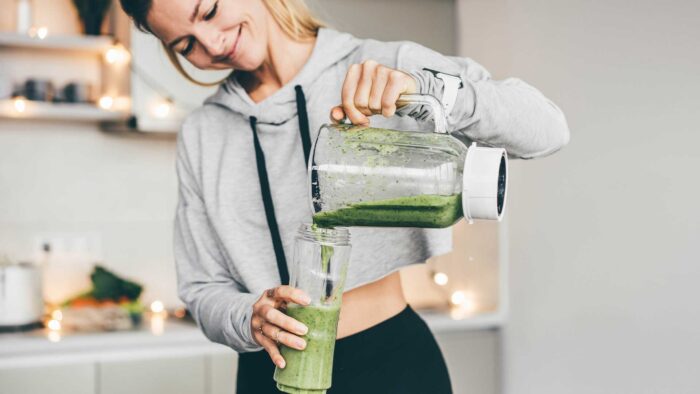Iron supplements and their benefits for health, energy and immunity
- READING TIME 7 MIN
- PUBLISHED February 07, 2024
- AUTHOR Donna
Key takeaways
- Iron is a vital mineral for transporting oxygen in the blood and supporting a robust immune system.
- Certain groups of people, such as expecting mothers, menstruating women+ and vegetarians, may find it challenging to maintain their iron levels solely through diet and could benefit from supplementation.
- You can maximize the absorption of iron by taking supplements on an empty stomach, adding vitamin C or avoiding specific foods and drinks like coffee.
- It’s critical to follow recommended dosages and consult your doctor before increasing your regular iron intake. Potential side effects of iron supplementation are rare but may include gastrointestinal issues.
Iron supplements and their benefits for health, energy and immunity
Every heartbeat, breath or step heavily relies on iron.
This mineral is an essential component of haemoglobin, a protein that helps transport oxygen in the blood from the lungs to the rest of the body. Iron is also a building block for energy production, muscle function, the immune system, brain activity and DNA creation.1, 2, 3
Despite its significance, iron deficiency is still a serious and widespread issue. It’s estimated that around 1.2 billion people globally are affected.4 The symptoms of deficiency include fatigue, weakness and pale skin. A more severe or prolonged condition may sometimes lead to unusual symptoms like brittle nails, hair loss and cravings for non-food items. Find out more about these and other symptoms, as well as treatments for iron deficiency in our recent article.
Diet is key to maintaining iron reserves, but sometimes it’s not enough
Many foods contain iron. Good sources include liver, red meat, beans, lentil, tofu, nuts and dried fruit. Seafood, particularly shellfish like clams, oysters and mussels, is also a great place to find iron. Note that plant and animal-based iron are not the same; research shows that our bodies better absorb iron found in meat and fish.5

But even with a balanced and iron-rich diet, it might not always be possible to meet the daily iron requirements solely through foods. And when dietary intake falters, iron supplements can bridge the gap.
Who’s more likely to benefit from iron supplements
Supplements are especially vital for people at higher risk for iron deficiency or those who have difficulty maintaining sufficient iron levels through diet alone. People who could benefit from supplementation include:6, 7
- Expecting mothers: Pregnancy amplifies iron needs that are necessary to nourish the growing foetus and placenta and to accommodate expanded blood volume. Pregnant women+ with severe iron deficiency may have higher risks of premature births and low birth weight babies.
- Menstruating women+: Heavy menstrual bleeding can lead to red blood cell loss and iron deficiency.
- Infants and young children: Iron supports early growth spurts. Babies store enough iron for the first six months of life; thereafter, their iron needs increase. Some infants may need additional iron, especially if born premature or underweight.
- Vegetarians and vegans: As mentioned, iron from plant-based foods is not absorbed as efficiently as iron from meat. Vegetarians and vegans might therefore need to take iron supplements to meet their daily requirements. Especially at risk are those who don’t consume enough iron-rich plant foods like lentils, chickpeas, quinoa or tofu.
- People with certain health conditions: Conditions like celiac disease, inflammatory bowel diseases and certain cancers can also increase iron requirements.
- Frequent blood donors: It is suggested that frequent donors take an iron supplement with 18–27 milligrams of elemental iron for at least 60 days after donating whole blood or double red cells.8
- Athletes and people who exercise intensely: Those engaging in high-intensity workouts might find their iron reservoirs depleted faster.

Navigating iron supplement varieties
Supplements differ in iron content and bodily absorption rates. The right supplement for you depends on several factors, including the severity of the potential deficiency, your overall health and possible side effects. Here are the three most used types:9
- Ferrous sulphate: A widespread prescription, lauded for its high level of absorption and efficacy in tackling iron deficiency anaemia.
- Ferrous gluconate: With its reduced elemental iron content, this milder variant might be better tolerated by those who otherwise experience gastrointestinal side effects.
- Ferrous fumarate: Offering a higher iron dose, it’s suitable for those requiring more iron but might come with gastrointestinal side effects.
Donna’s QUBIX IRON, for example, contains a special type of iron developed under the brand name Lipofer® that allows optimal absorption into the blood, is non-irritating to the stomach and doesn’t leave an unpleasant metallic taste. Learn more about QUBIX IRON here.

Optimising iron absorption
Several factors can influence the body’s absorption of iron. Some tips to maximise absorption while minimizing side effects include:
Timing. Iron is often better absorbed on an empty stomach.10 To mitigate potential stomach discomfort, you can eat a bit of food before but avoid taking the supplement with full-blown meals.11
Vitamin C partnership. Vitamin C can significantly boost iron absorption.12 Try to take your supplement with citrus, broccoli or a vitamin C supplement.
Avoid certain foods and drinks. While vitamin C supports absorption, some foods can hinder iron absorption – in certain cases by as much as 50 percent compared to when the iron is taken on an empty stomach. Foods and drinks to avoid include coffee, tea, milk, whole grains, soya products, as well as calcium. Try to take your supplement at least two hours before or four hours after consuming these.13
Consistency. Follow the prescribed doses and consider splitting higher doses for better absorption. Instead of taking it all at once, consider half in the morning and half in the evening.
Recommended dosages and duration
Iron intake recommendations vary based on age, gender and specific conditions like pregnancy. For example, men+ should take 8–10 milligrams daily, women+ between 15 and 18 milligrams, while expecting mothers will need to significantly up their intake to 27 milligrams.14, 15 We suggest you check your national guidelines for recommended daily iron consumption.

The amounts are also much higher when you need to treat iron deficiency anaemia. The dosage in this case ranges from 60–200 milligrams of elemental iron per day, typically split into two or three doses. It’s also essential to continue supplementation for at least three months and for an additional month after normalizing haemoglobin levels.
Always consult healthcare professionals for tailored advice and monitoring. Also, make sure never to exceed your daily amount. High doses, especially if you don’t suffer from iron deficiency, can lead to iron overload – a rare but serious condition that can damage vital organs like the liver and heart.16
Possible side effects of iron supplements
While generally safe, iron supplements might cause gastrointestinal issues like constipation and diarrhoea, as well as nausea and abdominal pain or discomfort. Some people might experience vomiting, particularly if they take supplements on an empty stomach. Iron supplements can also cause stools to turn dark green or black, which can be alarming but is typically harmless.
In rare instances, iron supplements can lead to a severe allergic reaction, causing symptoms such as hives, swelling of the face or throat, and difficulty breathing. If these occur, seek medical help immediately.17
Iron supplements can also interact with certain medications. For example, antacids (medicines that relieve indigestion and heartburn) and certain medications for acid reflux can reduce the absorption of iron. Iron can also interfere with the absorption of specific antibiotics, thyroid medication or calcium supplements.18, 19
Balance and precaution are key
Iron is a cornerstone of our well-being and ensuring appropriate iron levels is crucial. While supplementing can be beneficial – and in certain cases essential – you should still approach it mindfully. This means ensuring the right dosage and absorption while maintaining a balanced diet and a healthy lifestyle. If you feel unsure about any of this, it’s worth checking in with your doctor.
REFERENCES
- https://ods.od.nih.gov/factsheets/Iron-Consumer/
- https://www.med.umich.edu/cancer/files/why-is-iron-important.pdf
- https://pubmed.ncbi.nlm.nih.gov/10971835/
- https://ashpublications.org/blood/article/133/1/30/6613/Iron-deficiency
- https://www.hsph.harvard.edu/nutritionsource/iron/
- https://my.clevelandclinic.org/health/drugs/14568-iron-oral-supplements-for-anemia
- https://www.nhs.uk/medicines/ferrous-fumarate/pregnancy-breastfeeding-and-fertility-while-taking-ferrous-fumarate/
- https://clinicalcenter.nih.gov/blooddonor/iron.html
- https://sabm.org/physician-guide-to-oral-iron/
- https://medlineplus.gov/ency/article/007478.htm
- https://marionwomenshealthcenter.com/docs/iron-absorption/
- https://jamanetwork.com/journals/jamanetworkopen/fullarticle/2772395
- https://onlinelibrary.wiley.com/doi/full/10.1002/fbe2.12042
- https://ods.od.nih.gov/factsheets/Iron-Consumer/
- https://www.dge.de/wissenschaft/referenzwerte/eisen/
- https://www.healthline.com/nutrition/why-too-much-iron-is-harmful
- https://www.mayoclinic.org/drugs-supplements/iron-supplement-oral-route-parenteral-route/side-effects/drg-20070148
- https://www.webmd.com/vitamins/ai/ingredientmono-912/iron
- https://www.mayoclinic.org/drugs-supplements/iron-supplement-oral-route-parenteral-route/precautions/drg-20070148
RELATED ARTICLES
Explore more
Feed your curiosity with more content. Dive deeper and explore our selected articles, curated just for you.



